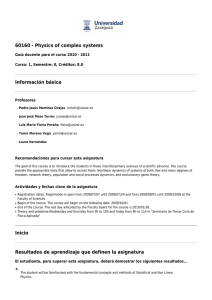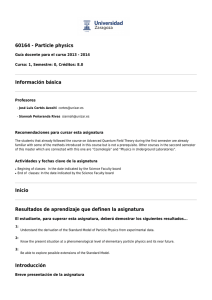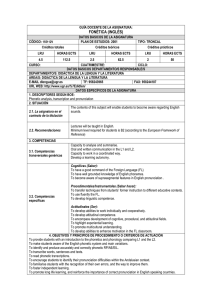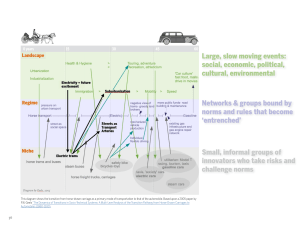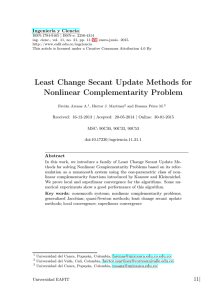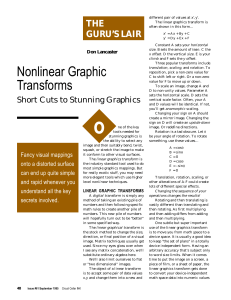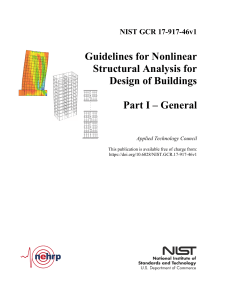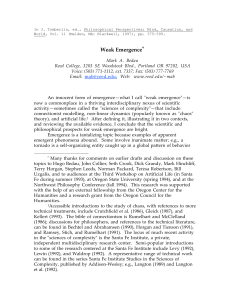60160 - Physics of complex systems Información básica Inicio
Anuncio
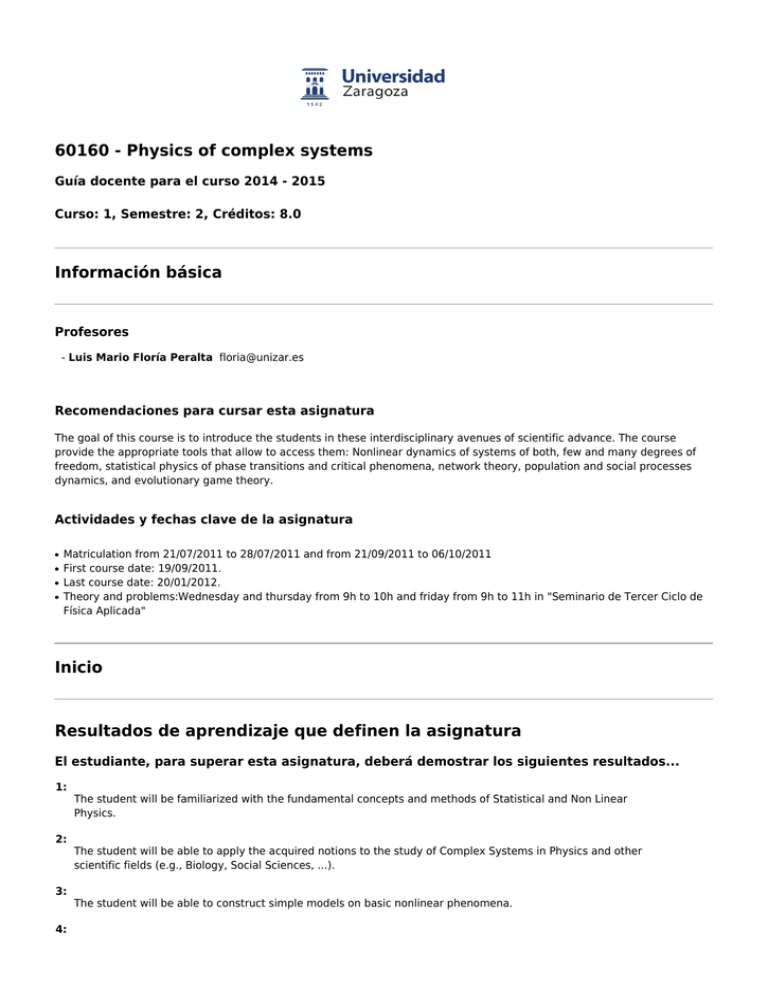
60160 - Physics of complex systems Guía docente para el curso 2014 - 2015 Curso: 1, Semestre: 2, Créditos: 8.0 Información básica Profesores - Luis Mario Floría Peralta [email protected] Recomendaciones para cursar esta asignatura The goal of this course is to introduce the students in these interdisciplinary avenues of scientific advance. The course provide the appropriate tools that allow to access them: Nonlinear dynamics of systems of both, few and many degrees of freedom, statistical physics of phase transitions and critical phenomena, network theory, population and social processes dynamics, and evolutionary game theory. Actividades y fechas clave de la asignatura ● ● ● ● Matriculation from 21/07/2011 to 28/07/2011 and from 21/09/2011 to 06/10/2011 First course date: 19/09/2011. Last course date: 20/01/2012. Theory and problems:Wednesday and thursday from 9h to 10h and friday from 9h to 11h in "Seminario de Tercer Ciclo de Física Aplicada" Inicio Resultados de aprendizaje que definen la asignatura El estudiante, para superar esta asignatura, deberá demostrar los siguientes resultados... 1: 2: 3: 4: The student will be familiarized with the fundamental concepts and methods of Statistical and Non Linear Physics. The student will be able to apply the acquired notions to the study of Complex Systems in Physics and other scientific fields (e.g., Biology, Social Sciences, ...). The student will be able to construct simple models on basic nonlinear phenomena. The student will be able to read and understand review scientific literature in the following subfields: Phase transitions and critical phenomena, chaos in dynamical systems, localized excitations, collective phenomena, game theoretical modelling, and complex networks. Introducción Breve presentación de la asignatura The course is an introduction to the subject of Statistical Physics and Complex Systems, an emerging scientific perspective that tries to overcome the limitations of the traditional reductionist approach that breaks systems into parts and tries to understand these parts. It is recommended to those students who like to improve their modeling skills, want to learn statistical physics, non-linear dynamics and network theory, or are interested in the interdisciplinary applications of physics. Contexto y competencias Sentido, contexto, relevancia y objetivos generales de la asignatura La asignatura y sus resultados previstos responden a los siguientes planteamientos y objetivos: The course in Physics of Complex Systems attempts to deepen students’ education in Statistical and Nonlinear Physics, while introducing some of the most recent research lines in cross-disciplinary Physics of Complex Systems. The goal is to make him familiar with the theoretical concepts and numerical techniques that are employed in this rapidly developing areas of research at the forefront of modern science. At the end of the course, the student should be able to use and apply some of these techniques to real scientific and even practical problems of his interest. Contexto y sentido de la asignatura en la titulación The recent opening of Physics, in particular that of Statistical and Nonlinear Physics, to new lines of interdisciplinary research has paved the way to newly emerged interdisciplines (Econophysics, Sociophysics), it has provided a renewed impetus on Biological Physics, and also important, as a natural feedback from the scientific interaction, this ongoing process may have interesting adaptive, thus wealthy, effects on the very concepts and methods of the physical theories when applied to these wider kind of contexts. This intellectually challenging movement from the community of stat and nonlinear physicists capitalizes on the powerful theoretical machinery of physical sciences to make progress in a large variety of scientific problems traditionally circumscribed to social, economical and biological sciences. Complex systems is today one of the more active research fields in physics. Being an interdiciplinary field is closely related with other subjects studied in the master as "Elements of biological physics" Al superar la asignatura, el estudiante será más competente para... 1: 2: 3: To understand the phenomenology of phase transitions and critical phenomena. To apply nonlinear dynamics, statistical physics and network theory to systems modeling in physical, biological and social sciences. To present a scientific report to a wide audience. Importancia de los resultados de aprendizaje que se obtienen en la asignatura: The goal of this course is to introduce the students in the interdisciplinary avenues of Physics of Complex Systems. The course provide the appropriate tools that allow to access them: Nonlinear dynamics of systems of both, few and many degrees of freedom, network theory, population and social processes dynamics, and evolutionary game theory. Evaluación Actividades de evaluación El estudiante deberá demostrar que ha alcanzado los resultados de aprendizaje previstos mediante las siguientes actividades de evaluacion 1: Evaluation tests for students who are able to attend the course. 1. Attendance and active partipation in large group activities (15%). 2. Solution (homework) and discussion of proposed exercises (35%). 3. Elaboration of a written report and its oral presentation on an academic project (50%). 2: Evaluation tests for students who are not able to attend the course on site or who fail to go at the first attempt. 1. Personal interview to assess acquired knowledge and skills (15%). 2. Solution (homework) and discussion of proposed exercises (35%). 3. Elaboration of a written report and its oral presentation on an academic project (50%). Actividades y recursos Presentación metodológica general El proceso de aprendizaje que se ha diseñado para esta asignatura se basa en lo siguiente: The results programmed for this course include achieving theoretical expertises in the field of complex systems. In order to get these results, we have programmed activities which improve the students active and continuous implication within the different topics. The course consists of two well separated training activities: theoretical lectures, including problem discussion and resolutions; and elaboration of a project, to adquiere an advanced knowledge of one of the topics of the subject. Actividades de aprendizaje programadas (Se incluye programa) El programa que se ofrece al estudiante para ayudarle a lograr los resultados previstos comprende las siguientes actividades... 1: Lectures on the main topics of the course. Such lectures will have the following contents: I Introduction. In depth overview of Statistical and Nonlinear Physics concepts and methods. II Phenomenology of phase transitions and collective phenomena in Physics and Interdisciplinary complex systems. Mean field approaches. III Percolation and Complex Networks theory. Diffussion and contact processes in lattices and networks. IV Scaling and Universality at criticality. The Renormalization Group Theory. V Interdisciplinary Complex Systems. Phase transitions in Network theory, KAM tori breakdown, epidemics, population dynamics, social interaction models, … 2: 3: 4: Interactive problem solving training sessions. Student personal (and/ or group) work on solving proposed exercises. Study, oral exposition, and discussion with the class group, of selected research articles. Planificación y calendario Calendario de sesiones presenciales y presentación de trabajos Starting February 2015, till May 30 2014, lectures and problem solving training sessions will take place every Moday (12-13), Tuesday (12-13), Wednesday (10-12) and Thursday (11-12). Referencias bibliográficas de la bibliografía recomendada ● ● ● ● ● ● ● ● ● ● ● ● ● Barrat,A.; Barthélemy,M.; Vespignani,A.. Dynamical Processes in Complex Networks. Cambridge University Press 2008 Buckingham, M.J. "Thermodynamics". En: Phase transitions and critical phenomena. Vol.2 / edited by C. Domb and M. S. Green . London [etc] : Academic Press, 1972 Cardy, John. Scaling and renormalization in statistical physics / John Cardy . - 1st ed. reprint. with corr. Cambridge : Cambridge University Press, 1997 Christensen, Kim. Complexity and criticality / Kim Christensen, Nicholas R. Moloney London : Imperial College Press, cop. 2005 Fisher, M.E.. Renormalization group theory: Its basis and formulation in statistical physics. Modern physics letters A. . Singapore : World Scientific, cop. 1986- [Publicación periódica] [Review of Modern Physics 70, 653-681 (1998).] Kadanoff, L.P. "Scaling at critical points". En: Phase transitions and critical phenomena. Vol.5 A / edited by C. Domb and M. S. Green . London [etc] : Academic Press, 1976 Modern physics letters A Singapore : World Scientific, cop. 1986- [Publicación periódica] Newman, M. E. J.. Monte Carlo methods in statistical physics / M. E. J. Newman and G. T. Barkema . - 1st ed. with corr. Oxford : Clarendon Press, 2006 Newman, M.E.J.. Networks: An Introduction. Oxford University Press. 2010 Plischke, Michael. Equilibrium statistical physics / Michael Plischke, Birger Bergersen . - 3rd ed. New Jersey [etc.] : World Scientific, cop. 2006 Stauffer, Dietrich. Introduction to percolation theory / Dietrich Stauffer London : Taylor & Francis, 1985 The theory of critical phenomena : an introduction to the renormalization group / J. J. Binney ... [et al.] . - 1st ed. repr. with corr. Oxford : Clarendon Press, 2002 Yeomans, J. M. Statistical mechanics of phase transitions / J.M. Yeomans. - 1st ed., [1st] reprint. Oxford [England] : Clarendon Press ; New York : Oxford University Press, 1992 (reimp. 1993)
